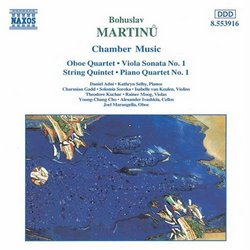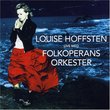| All Artists: Bohuslav Martinu, Daniel Adni, Kathryn Selby Title: Martinu: Chamber Music Members Wishing: 0 Total Copies: 0 Label: Naxos Release Date: 9/17/1996 Genre: Classical Styles: Chamber Music, Instruments, Strings Number of Discs: 1 SwapaCD Credits: 1 UPC: 730099491624 |
Search - Bohuslav Martinu, Daniel Adni, Kathryn Selby :: Martinu: Chamber Music
 | Bohuslav Martinu, Daniel Adni, Kathryn Selby Martinu: Chamber Music Genre: Classical
|
Larger Image |
CD DetailsSimilar CDs
|
CD ReviewsAn excellent Martinu album T. Murphy | San Jose, California United States | 11/27/2002 (5 out of 5 stars) "In an Amazon.com review of a different CD (the Naxos recording of Martinu's flute trio), someone parenthetically took a cheap shot at the pieces on this album, calling them "vacuous and annoying."Well, don't let that idiot put you off this CD. These pieces might not be as instantly accessible as some of Martinu's other chamber works, but they are all excellent pieces of music. I can see how the intensely contrapuntal textures and idiosyncratic melodic lines may seem overwhelming initially, but after a few listens these features disentangle themselves- the music is often 'busy', but this is because it is very detailed and (I think) beautiful. The Quartet for Oboe, Violin, Cello, and Piano is very fresh and lively, and the Piano Quartet No. 1 gets better every time I hear it." An Artist Whose Time Will Come Grady Harp | Los Angeles, CA United States | 02/28/2006 (5 out of 5 stars) "Bohuslav Martinu seems to polarize even lovers of contemporary music. While there are those who dismiss his output as superficial, there are equally vociferous societies who maintain blogs on the internet that make Martinu an icon. Where he actually falls is probably somewhere in the middle, though this lovely album of his chamber music hopefully will convince some doubters of his worth. Anyone living in the Southern California area has grown to know Martinu through the auspices of KUSC music guru Jim Svejda whose nightly broadcast Music Shelf opens with the third movement (Allegretto poco moderato) of the Martinu Piano Quartet No. 1 - that splendid piano solo that is gradually joined b the pulsating and quirky strings. It is a 'popular favorite' among Svejda's devotees and garners more questions to the radio station staff than any other question posed! The Piano Quartet is here performed by Rainer Moog (piano), Daniel Adni, Young-Chang Cho and Isabelle van Keulen and captures all the playful business of this charming work. The other works on this well-recorded album include the Quartet for oboe, violin, cello & piano with Charmian Gadd, Joel Marangella, Alexander Ivashkin, Kathryn Selby, the lyrically dreamy Sonata for viola & piano with Daniel Adni, viola and once again Rainer Moog, piano. The final offering is one of the folk song inspired Quintet for 2 violins, 2 violas & cello with Charmian Gadd, Solomia Soroka, Rainer Moog, Young-Chang Cho, Theodore Kuchar. For an introduction to the music of this strong composer this fine CD recorded at the 1994 Australian Festival of Chamber Music is a fine starting point. And then on to the symphonies... Recommended. Grady Harp, February 06 " Excellent Chamber Music Find rodboomboom | Dearborn, Michigan United States | 02/25/2005 (5 out of 5 stars) "Recently heard on the radio the playing of the Oboe Quartet of this recording and was blown away with the lively and spirit of the peace.
Pleasantly surprised to find it on this truly budget price with additional chamber offeriings of this late 19th-early 20th century composer. The additional offerings are well done by musicians at the 1194 Australian Chamber Festival. My favorite in addition to the Oboe Quartet is the Viola Sonata which is luscious and flowing with shades of his previous Rhapsody Concerto. The Piano and String Quartets are fine, echoing Martinu's master: Roussel." |

 Track Listings (10) - Disc #1
Track Listings (10) - Disc #1

